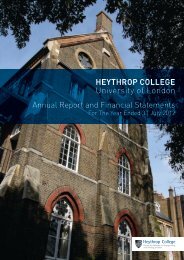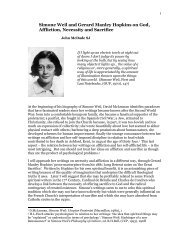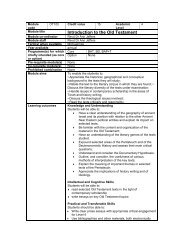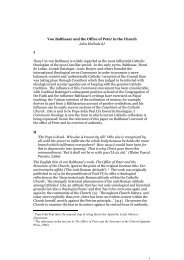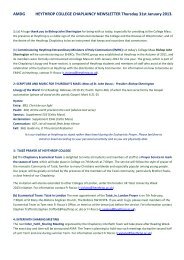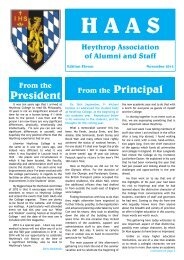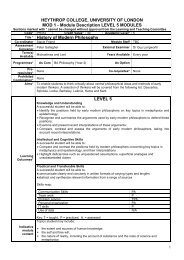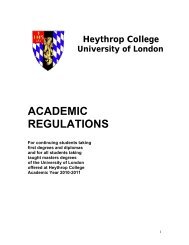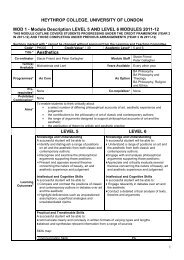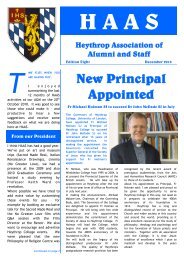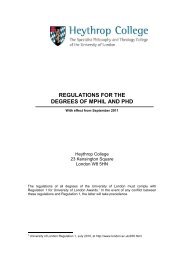Wallace_Stevens.pdf - Heythrop College
Wallace_Stevens.pdf - Heythrop College
Wallace_Stevens.pdf - Heythrop College
You also want an ePaper? Increase the reach of your titles
YUMPU automatically turns print PDFs into web optimized ePapers that Google loves.
6<br />
of trust; without it, how can we avoid the accusation that it is spun out of us as a manifestation of<br />
our nature rather than God’s<br />
If theology springs simply from ‘our words about God’, even our most inspired words about God,<br />
we are in no position successfully to be sure that we are truly dealing with God and not with<br />
human imagining. You will recognise the challenge launched above all by Feuerbach in the<br />
nineteenth century whose work, The Essence of Christianity, treated God as a projection of<br />
human aspirations and values: religion and theology are no more than a poetic anthropology,<br />
telling us something about ourselves and nothing about God. 16 Barth thought that if you dealt<br />
with the question of God by locating it as the object of a movement within us, we would not be<br />
able to pass unscathed through the ‘fire-stream’ that is Feuerbach. 17 Liberal Protestantism,<br />
guided by Schleiermacher, has no defence against Feuerbach, he judged.<br />
The only alternative that Barth saw was to found the Christian religion and its theology on God’s<br />
‘language’ about himself, his Word spoken to us from within the very being of God as an<br />
objectively constituted self-expression of the divine. On the basis of Christ, the divine Word made<br />
flesh, we can claim to have a knowledge of God that does not originate in human imagining. Of<br />
course the revelation is to be interpreted and human categories must be used, but according to<br />
Barth, this reception of the revelation belongs with the dynamic of the revelation itself and is not a<br />
subsequent ‘human work’ – as a good Calvinist, he has a low opinion of all ‘human works’. The<br />
Holy Spirit, ‘the seeing eye of grace in us’ (Balthasar), ensures that the revelation in Christ is<br />
interpreted correctly, with consequences for the doctrine of God appropriate to this particular<br />
shape of God’s self-iteration.<br />
If this is the correct approach, Barth argued, then Christianity is not a religion alongside other<br />
‘religions’. Revelatio dei non est in genere: God’s revelation is not one instance among others in a<br />
category of religious systems. A religion is how humans imagine God; by contrast, Christianity is<br />
based, not on how we construe and project the divine, but on God’s statement about himself in<br />
the history of Israel, the person of Jesus Christ, the faith of the Church and the Scriptures<br />
associated with this revelatory Word. So Christianity is removed at a stroke from the category of<br />
‘imperfect’, non-cognitive religions that can give us no more than a version of human aspirations<br />
projected on to putative divine figures. And, at a stroke, it is removed from the category of human<br />
imagination proposed by Santayana and <strong>Stevens</strong>.<br />
If you take the Santayana and <strong>Stevens</strong> line, there is no objective basis on which our knowledge of<br />
God or Jesus Christ can be calibrated, tested and evaluated. Santayana thought that Statius’s line,<br />
Primus in orbe deos fecit timor (‘fear was the first to make gods in the world’) ‘is as true as<br />
anything so brief can be on so great a subject’. 18 If the first gods were the imaginative effects of<br />
fear, others presumably follow so ‘it would be nearer the truth to base religion on the whole<br />
psychic complex of man’; 19 Freud’s attribution of religion to structural neurosis is not far away.<br />
Because religion, the older form of the imagination, is able no longer to enchant us, now we are to<br />
achieve the same outcome aesthetically. When religion ceases to be credible, the same quality of<br />
significance can be attained through poetry and art, as <strong>Stevens</strong> asserts:<br />
One of the visible movements of the modern imagination is the movement away from the<br />
idea of God. The poetry that created the idea of God will either adapt it to our different<br />
16 George Eliot translated Feuerbach’s The Essence of Christianity in 1854.<br />
17 Barth’s criticisms are primarily directed against Schleiermacher who responded to Kant’s<br />
critique of God-talk by choosing to begin theology as an exploration of the humanum, the<br />
experiences and impulses within human nature that indicate a relatedness to the Infinite.<br />
18 Quoted in J.Ratner, ‘George Santayana’s Theory of Religion’, The Journal of Religion 3 (1923),<br />
459-75; 464<br />
19 Ratner, 466.



